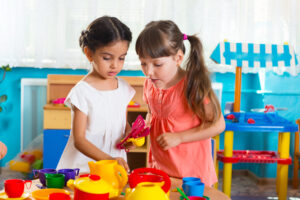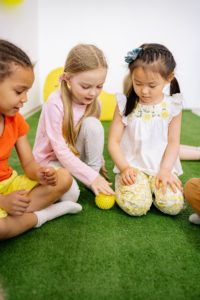Why Learning to Work in Groups is Key for Kids
 When we think about what kids need to succeed in life, we often focus on reading, writing, and math. But there’s one skill that’s just as important—and it’s learned through something as simple as group play: teamwork.
When we think about what kids need to succeed in life, we often focus on reading, writing, and math. But there’s one skill that’s just as important—and it’s learned through something as simple as group play: teamwork.
From a young age, kids need to understand how to work together with others, share ideas, solve problems, and support each other. And that’s where group activities—whether it’s a project, a game, or even a learning activity—come in. Group work helps kids build not just physical skills but important social, emotional, and cognitive abilities too. Here’s why group work matters, and what skills kids develop through it!
- Communication Skills
When kids are in a group, they have to talk and listen. They have to explain their ideas, ask questions, and sometimes even argue their point. It gives great practice to express themselves clearly. Whether it’s asking for help or offering support, effective communication is a huge part of working in a team.
- Cooperation & Sharing
Sharing space, materials, or even the spotlight can be tricky for young kids. Group activities teach them how to take turns, be considerate, and learn that sometimes they need to compromise.
- Problem-Solving
Group work pushes kids to think on their feet. Whether it’s figuring out how to finish a puzzle together or deciding how to organize their play, they start developing key problem-solving skills.
- Emotional Regulation
Group settings are also a great place to practice managing feelings. Kids learn to handle frustration if things don’t go their way, and they get the chance to celebrate each other’s successes.

- Empathy & Social Skills
Working in groups helps kids understand and relate to others. They learn to recognize different feelings and perspectives, which builds empathy—a crucial skill for building friendships.
- Building Confidence
When kids succeed as part of a team, it boosts their confidence. Whether it’s through a group project or a collaborative game, seeing their efforts pay off with their peers builds a sense of accomplishment. As they practice teamwork, they get better at working with others and feel more self-assured.
- Attention and Following instructions
Group work also teaches kids how to stay focused and follow instructions. Whether they’re listening to a peer’s idea or following directions in a group game, they learn how to stay on track and contribute.
- Fine & Gross Motor Skills Development
Group activities aren’t just about talking and thinking—they’re also great for physical development! Kids can build fine motor skills when they engage in arts and crafts (think cutting, coloring, and assembling), and they’ll work on gross motor skills during activities like running, jumping, or even team sports. Whether it’s making a craft together or playing a group game outside, physical skills improve in group settings too!
At the end of the day, group work isn’t just about learning content—it’s about learning how to work with others.
Whether they’re developing motor skills, social skills, practicing leadership, or solving problems together, kids are building a wide range of skills they can use. Plus, they’re forming friendships, gaining confidence, and learning how to navigate the complexities of social engagement.
So next time you see your child working on a group task, remember: it’s more than just fun and games. It’s a chance to help them grow into confident, capable team players ready for whatever comes their way!
If you would like further information regarding therapy or the intervention process, please don’t hesitate to get in touch with our Occupational Therapists via [email protected] or call us at the clinic on (07) 3265 4495.

Written by Helena Manicaros, 2024 (Occupational Therapist)
